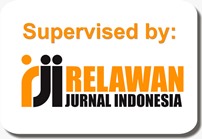THE INFLUENCE OF ORGANIZATIONAL CULTURE AND REWARDS SYSTEM ON THE PERFORMANCE EMPLOYEES OF HOTEL IN BATAM CITY WITH ORGANIZATIONAL COMMITMENT AS INTERVENING VARIABLES
Abstract
Keywords: Organizational Culture, Rewards System, and Organizational Commitment
Employee performance
Full Text:
PDF (Bahasa Indonesia)References
Erlina, (2011). Metodologi Penelitian: Untuk Akuntansi, USU PRESS, Medan.
Fred Luthans, (2011), Perilaku Organisasi. Edisi Sepuluh, PT. Andi: Yogyakarta.
Gibson, James L, John M Ivancevich dan James H Donely Jr, 1997, Organisasi dan Manajemen: Perilaku, Struktur, Proses, Edisi 4, Terjemahan Djoerban Wahid, penerbit Erlangga, Jakarta
Humphreys, J.H.(2002).” Transformational leader behavior, proximity and successfulservices
marketing” Journal of Services Marketing, Vol. 16, No.6, pp.487-502
Ghozali, I (2004), ”Model Persamaan Struktural, Konsep dan Aplikasi dengan Program AMOS
Versi 5.0”, Badan Penerbit Universitas Diponegoro Semarang Journal of Marketing,
Vol.57,(July), p.53-70
Jurkiewicz C.L.,Massey, T.K and R.G Brown, (2008), Motivation in Public and Private
Organizations: A Comparative Study, Public Productivity & Management Review, 21,
p.230-250
Kreitner, Robeth, Kinnichi, Angelo, (2005), Perilaku Organisasi, Edisi 5, Salemva Empat,
Jakarta
Krivonos, Paul D, (2006), The Relationship of Intrinsic-Extrinsic Motivation and
Communication Climate in Organizations, The Journal of Bussiness communication.
Locander, W.B.,F. Hamilton,D. Ladik & J Stuart (2002), “Developing a Leadership-Rich ulture:
The Missing link to creating a market-focused organization, journal of marketing-
focused management, Vol.5, pp.149-163
Mohd Noor, K. B.,& Dola K. (2009). Job Competencies for Malaysian Managers in Higher
Education Institution. Asian Journal of Management and Humanity Sciences, Vol. 4, No. 4, pp. 226-240.
Moeheriono, (2012). Pengukuran Kinerja Berbasih Kompetensi, Edisi Revisi, Jakarta: Rajawali Pers.
Martoyo, Susilo. (2010). Manajemen Sumber Daya manusia. Edisi Kedelapan. BPFE.
Yogyakarta
Malayu S.P Hasibuan, (2013).Manajemen Sumber Daya Manusia dasar dan kunci keberhasilan ,
CV. Haji Masagung, Jakarta.
Moeheriono. (2010). Pengukuran Kinerja Berbasis Kompetensi. Surabaya: Ghalia Indonesia
Robbins, Stephen P. dan Timothy A. Judge. (2008). Perilaku Organisasi Edisi ke-12, Jakarta: Salemba Empat.
Robbins, Stephen P. & Timothy A. Judge. (2009). Organizational Behavior. 13 Three Edition,
USA: Pearson International Edition, Prentice-Hall
Robbins, Stephen P. dan Coulter M. (2010). Manajemen, Edisi Kesepuluh, Jakarta: Erlangga.
Robbins, Stephen P & Judge, Timothy A. (2013). Organizational Behavior Edition 15. New
Jersey: Pearson Education
Robbins, Stephen, (2013), Perilaku Organisasi,Prehalindo, Jakarta
Sangadji , Etta Mamang & Sopiah. (2010). Metodologi Penelitian–Pendekatan. Praktis
dalam Penelitian, Yogyakarta, ANDI.
Sugiyono. (2011). Metode Penelitian Kuantitatif, Kualitatif dan R &D. Bandung: Afabeta
Sugiyono. (2014). Metode Penelitian Pendidikan Pendekatan Kuantitatif, Kualitatif Dan R&D.
Bandung: Alfabeta
Shore, L.M dan L.E. Tetrick, (1991), A Contruct Validity Study of the Survey of Perceived
Organizational Support, Journal of Applied Psychology, Vol. 76, p. 637-643
Sukanto Reksohadiprojo, (2008). Manajemen Produksi. Edisi ke-4. BPFE. Yogyakarta.
Schuler, Jackson. (2005). Manajemen Sumberdaya manusia, 6 th ed, Erlangga: Jakarta.
Wirawan. (2012). Budaya dan Iklim Organisasi Teori Aplikasi dan Penelitian. Jakarta: Salemba
Empat.
DOI: https://doi.org/10.31846/jae.v6i3.95
Refbacks
- There are currently no refbacks.

This work is licensed under a Creative Commons Attribution-NonCommercial-NoDerivatives 4.0 International License.
e-Jurnal Apresiasi Ekonnomi Indexed by:












